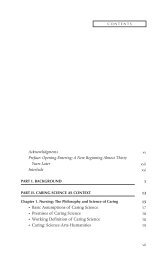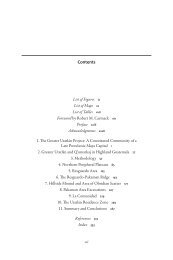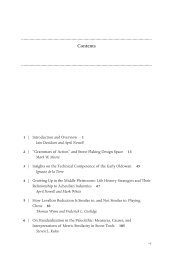free download - University Press of Colorado
free download - University Press of Colorado
free download - University Press of Colorado
Create successful ePaper yourself
Turn your PDF publications into a flip-book with our unique Google optimized e-Paper software.
Global Environmental Change, Resilience, and Sustainable Outcomes<br />
building social networks to provide aid and shelter to those affected. We have<br />
also recognized in recent years that hazards differentially impact the weaker<br />
segments <strong>of</strong> society and that building their capacities would disproportionately<br />
lower the overall vulnerability <strong>of</strong> the system.<br />
Related to efforts to reduce system vulnerability by lowering the sensitivity<br />
<strong>of</strong> the system is building its resilience to stresses and shocks. The resilience <strong>of</strong><br />
a social-ecological system is defined as its ability to experience external stresses<br />
and shocks and maintain its core functioning and characteristics (Folke 2006;<br />
Holling and Gunderson 2002). Nelson and her colleagues as well as Paulette<br />
relate their case studies to ideas from resilience theory. Several key concepts<br />
resonate with the situations described in the case studies. First is that change<br />
is to be expected and welcomed rather than feared and resisted. The goal is<br />
to experience change in a “graceful” way that does not damage the system in<br />
an undesirable way. Resilience theorists have created a metaphor figure shaped<br />
like a figure 8 to represent the stages <strong>of</strong> the adaptive cycle <strong>of</strong> a system experiencing<br />
change (Holling and Gunderson 2002: figure 2.1). The adaptive cycle<br />
emphasizes the opportunity for positive growth to result from stress-induced<br />
system change.<br />
F. Stuart Chapin and his colleagues (2009: 324–328) have suggested four<br />
domains <strong>of</strong> strategies that would enhance social-ecological resilience: fostering<br />
biological, economic, and cultural diversity; fostering a mix <strong>of</strong> stabilizing feedback<br />
and creative renewal; fostering social learning through experimentation<br />
and innovation; and adapting governance to changing conditions. Among the<br />
strategies they recommend, several are particularly appropriate here. Renew the<br />
functional diversity <strong>of</strong> degraded systems after the hazard or sudden change has<br />
occurred. Foster retention <strong>of</strong> stories that illustrate past patterns <strong>of</strong> adaptation<br />
to change (eco-knowledge as described in Cooper’s chapter). Subsidize innovations<br />
that foster economic novelty and diversity. Foster stabilizing feedbacks<br />
that sustain natural and social capital. Allow modest disturbances that permit<br />
the system to adjust to changes in underlying controls. Broaden the problem<br />
definition by learning from multiple cultural and disciplinary perspectives and<br />
facilitating dialogue and knowledge coproduction among multiple groups <strong>of</strong><br />
stakeholders. Provide an environment for leadership to emerge and trust to<br />
develop. Foster social networking that bridges communication and accountability<br />
among existing organizations.<br />
Sudden environmental change has characteristically been viewed with horror.<br />
Its unpredictability, enormity, and devastating impact on numerous people<br />
contribute to its being seen as a terrible calamity. There is no question that<br />
both modern and ancient natural hazards have caused significant loss <strong>of</strong> life<br />
and property and adversely affected many people. Unfortunately, the course <strong>of</strong><br />
modern history seems to have made these patterns worse, not better. Damage<br />
could be reduced and loss <strong>of</strong> life minimized, and in many cases positive results<br />
243





